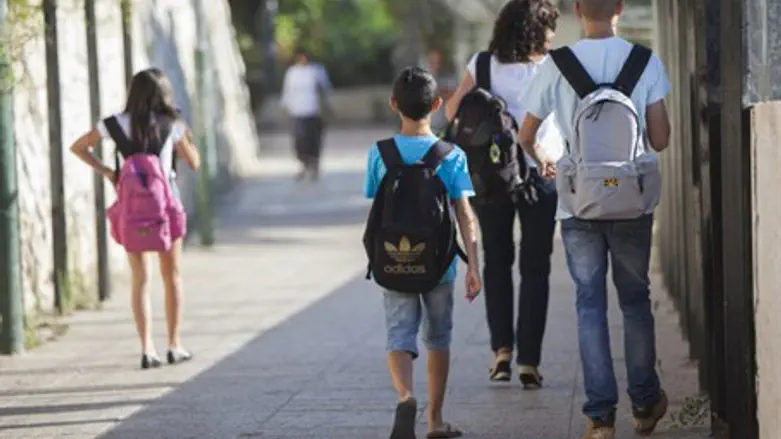
The prevalence of child abuse in Israel is much higher than we know, a University of Haifa study has revealed.
Data from the study, to be revealed Tuesday in a Knesset Committee for Children's Rights hearing, shows that 48.5% of Israeli children (nearly 1/2) have suffered some form of abuse - physical, mental, emotional, sexual - or has otherwise suffered from negligence or exposure to domestic violence.
The landmark study examines the full scope of child abuse across the country for the first time since Israel's founding. Data was collected from a sample of children representing the national population, ages 12, 14, and 16 (6th, 8th, and 10th grades) in both the Jewish and Arab sectors. In total, the study examined 8,239 Jewish children and 2,274 Arab children.
The most common complaint was emotional abuse, found amongst 27.8% of participants. 17.6% reported sexual abuse and 14.1% reported physical abuse. 14-15% of respondents reported physical or emotional neglect, and 8.6% have been exposed to domestic violence. The numbers were particularly high in the Arab sector, where 67.7% of participants admitted to suffering abuse of some kind.
Most children responded that after being abused, they preferred to tell a parent, with siblings and friends rounding out the second and third preferences. Children prefer to tell professionals far less than a close relative; only 38.5% confirmed that they would report abuse to a teacher/counselor, 24% to a nurse or doctor, and only 18.2% to a social worker. 63.3% of children claimed that they would never tell a social worker about any kind of abuse, no matter what the circumstances.
The study was conducted by the University's Center for Social Research, headed by Professor Tzvi Eisikovits and Professor Rachel Lev-Wiesel in conjunction with the Ministry of Education and financed by the Traiana group, headed by Gil Mandelzis.
Until now, a study of this scope and scale had not been conducted in Israel, and had not included input by children themselves. Previous data on child abuse had been gathered based on information from government reports and ministries, not work in the field. Hopes are high that the new data will help police catch abusers more quickly.
The Knesset meeting today was conducted by MK Orly Abekasis (Yisrael Beitenu) to mark International Children's Rights Day. "There is a huge gap between the number of child abuse cases reported to authorities and the number of children being abused in practice," the MK said. "The numbers prove that we cannot maintain this gap any longer."
"The data paints an alarming and disturbing picture of the situation that must be acknowledged," she continued. She vowed to ensure that the issue not remain overlooked.
Yitzchak Kadman, President of the National Board for Children's Welfare, added that the results are "earth-shattering - no less. What we've found is that the data we had on child abuse up until now was not even the tip of the iceberg. All the systems and factors involved in solving abuse problems need to be re-engineered from the ground up."
Criticism
Conservative critics point out that the results and the methodology of the study need to be studied carefully before reaching any conclusions. Israel's welfare system is notoriously socialistic and biased toward state-centralism, they say, with relatively high rates of removal of children from their parents' custody. The study's results, as reported in the press, do not appear to differentiate between abuse by parents and abuse outside the home, possibly creating an illusion that more abuse is carried out within the home than actually takes place.
The questions based upon which the study determines that a child has undergone "emotional abuse," particularly, need to be checked, as do the researchers' definitions of this abuse, say the conservative critics.
Previous studies by the University of Haifa came under fire for extreme bias in the way they reported on domestic violence between men and women. The world's top authority on domestic violence, Prof. Murray Straus, specificaly singled out one such report by Haifa University and discredited its methodology and findings, explaining that statistics of perpetration of domestic violence show a pattern of symmetry between the sexes, and that such violence is largely mutual in nature.
Biased statistics that show men as the sole perpetrators of violence are used as justification for state policies that favor removal of children from their fathers' custody in divorcing couples. One father recently sued a psychiatrist for determining that he is dangerous to his children although the psychiatrist never even met him.